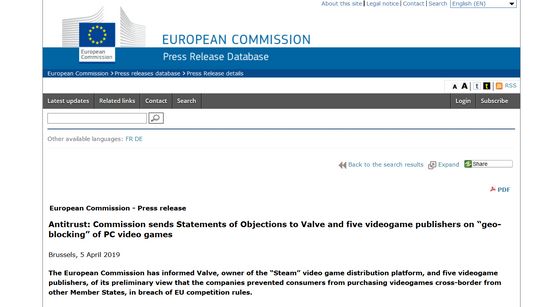Anti-trust law violation pointed out that purchased games can not be played on Steam in certain countries

The game distribution platform
European Commission-PRESS RELEASES-Press release-Antitrust: Commissions Sentences of Objects to Valves and Five videogames publishers on 'geo-blocking' of PC video games
http://europa.eu/rapid/press-release_IP-19-2010_en.htm

Valve responds to the European Commission's demands regarding geo-locking · Steam Database
Valve called out by the European Commission for geo-blocking games (updated) | PC Gamer
https://www.pcgamer.com/valve-called-out-by-the-european-commission-for-geo-blocking-games/
On April 5, 2019, the EC sent to Valve, which operates the world's largest game distribution platform, a statement of opinion that an interregional purchase restriction policy would violate the EU's antitrust law. The statement also mentions five game publishers: Namco Bandai , Capcom , Focus Home , Koch Media and Zenimax .
Steam provides 'activation keys' to multiple game publishers. Users who purchase a game with physical media will be able to play the game with Steam once the game has been certified with Steam. Valve and the five game publishers set up regional restrictions on the activation key, making it impossible to play games purchased in certain countries.
Interregional restrictions have been applied to countries such as the Czech Republic, Estonia, Hungary, Latvia, Lithuania, Poland, Slovakia and Romania. It is the EC's claim that 'the ban on people in EU countries outside the target country to buy games in restricted countries is an act that impedes the freedom to buy cheaper games.' In addition, four game publishers, except Capcom, are said to have violated the EU's antitrust laws by setting restrictions such as 'do not export games to specific countries' and distributors other than Valve.

by
“In a true digital single market, EU consumers should have the right to buy and play games regardless of the country they live in,” said Margrethe Vestager, head of EC's market competition policy. 'The consumer has the right to buy the game in the most favorable conditions in the EU countries, and this right should not be barred.'
Valve responds immediately to claims that it violates the EU antitrust law. Valve claims that they are only providing activation keys to game publishers, and that they do not benefit from cross-regional activation key activation.
Also, if you are using a game distribution platform such as Steam, when you try to buy a game, 'This item is not currently available in your area' is displayed, and the game causes a problem of country and nationality. You may not be able to buy This phenomenon, which is also known as the ' Omakuni ' on the Internet, has basically been lifted from 2015 within the European Economic Area (EEA) .

by Soumil Kumar
Valve stated that it did not violate the EU's anti-monopoly law, and 'the abolition of the regional restriction on activation keys would increase the game selling price even in countries where game publishers are not rich. It's likely to lead, 'he said, with interregional restrictions helping to set pricing according to the region. If you buy the game in a region where the game is cheaper and bring it to your home country, users have expressed concern that the game can be played at a lower price than the publisher expected.
Related Posts:
in Web Service, Game, Posted by log1h_ik







